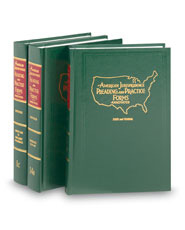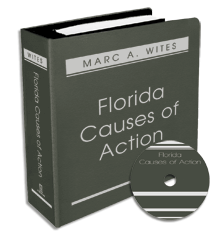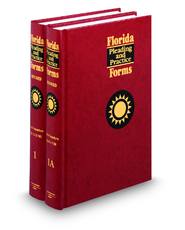
 American Jurisprudence Pleading and Practice Forms Annotated by
American Jurisprudence Pleading and Practice Forms Annotated by  Florida Causes of Action by
Florida Causes of Action by 
"Checklist of matters, among others, that should be alleged in a complaint, petition, or declaration seeking to state a cause of action for injury or death caused by the discharge of a weapon or firearm."


Complaint for Declaratory and Injunctive Relief
Johnie E. LEWIS, Plaintiff, v. THE HOUSING AUTHORITY OF FERNANDINA BEACH, and Patricia Woody, in her official capacity as Executive Director of the Housing Authority of Fernandina Beach, Defendants., 2009 WL 6483893 (Fla.Cir.Ct.)
"This is an action under for declaratory relief pursuant to Chapter 86, Fla Stat as well as injunctive relief concerning the right of law abiding, responsible residents of public housing in Fernandina Beach, Florida, to keep firearms in their homes for self defense and other lawful purposes, as guaranteed by the United States Constitution and the Florida Constitution."
"This action arises out of the tragic shooting death of schoolteacher, BARRY GRUNOW, by a seventh-grade student, on May 26, 2000, in Lake Worth, Florida. This tragedy occurred because a firearm distributor and a firearm dealer sold a handgun that was unreasonably dangerous and lacked means to prevent an unauthorized person from using it, because a firearm owner negligently stored the gun where a juvenile could obtain access to it, and because a thirteen-year-old boy was able to easily use (operate) the gun."

1. This is an action for damages for a sum within the jurisdictional limits of this court, to wit: [statement of jurisdictional amount].
2. Plaintiff is the duly acting and qualified administrator of the estate of [name of decedent], deceased, who at the time of death was a resident of [name of county], Florida. [Name of decedent], deceased, met [his/her] death on [date of death] in the place and manner alleged below. The beneficiaries of any recovery in this action, in addition to the estate of deceased, and their relationships to deceased are as follows: [list of names of beneficiaries] [statement of beneficiaries' relationships to decedent].
3. The place of the administration of the estate of plaintiff's decedent is [name of county], Florida.
4. At the time of plaintiff's decedent's death, plaintiff's decedent was a minor of the age of [number of years] years and resided with[his/her] parents at [address of plaintiff], [name of city], [name of county], Florida.
5. On [date of incident], plaintiff's decedent's [father/ mother] was employed by defendant to do certain [repair/[type of work]] work at defendant's residence located at [address of defendant], [name of city], [name of county], Florida.
6. It was the custom of plaintiff's decedent's [father/mother] to bring plaintiff's decedent with [him/her] when working on a job. Plaintiff's decedent's [father/mother] had taken [his/her] [son/daughter] to defendant's residence on other occasions with the knowledge and acquiescence of defendant.
7. Plaintiff's decedent accompanied [his/her] [father/mother] to defendant's residence on the above date, and defendant had full knowledge of the child's presence and acquiesced in such presence.
8. Defendant owned, maintained, and controlled on defendant's premises a loaded revolver, which defendant kept in a bedroom in an easily accessible location.
9. Defendant knew from past experience that there was a high probability that the visiting child would pass through the bedroom in order to reach defendant's bathroom while plaintiff's decedent's [father/mother] was engaged in [his/her] occupation.
10. Defendant knew, or in the exercise of ordinary care should have known, that a loaded revolver easily accessible to a [number of years]-year old child constituted a great hazard to the life of such child.
11. Defendant wrongfully and negligently failed to take reasonable precautions to protect plaintiff's decedent in that defendant neither warned plaintiff's decedent's [father/ mother] of the existence of the dangerous loaded revolver nor placed the revolver out of reach of the child.
12. On the above date, at [time of day], plaintiff's decedent entered defendant's house, with defendant's permission, to use the bathroom, and while passing through defendant's bedroom, found the loaded revolver and fired a bullet through [his/her] head, resulting in the child's instantaneous death.
13. Defendant's negligence in leaving a loaded revolver in open view in defendant's bedroom and within reach of plaintiff's decedent, without warning plaintiff's decedent's [father/mother] was a direct and proximate cause of the death of plaintiff's decedent.
1. There are no material disputed facts and the undisputed facts do not establish a prima facie case of guilt against the defendant. The undisputed facts are as follows: [statement of facts].
2. After trial by jury, the defendant was found not guilty. This verdict indicated that the jury found that:
(a) The defendant did not initially provoke the use of force;
(b) The defendant reasonably believed that force was necessary to prevent imminent death or great bodily harm to himself;
(c) That the degree of force asserted toward the defendant was so great that he reasonably believed that he was in imminent danger of death or great bodily harm and had exhausted every reasonable means to escape the danger, other than using force likely to cause death or great bodily harm to his attacker;
(d) That in good faith, defendant indicated a willingness to cease the combat to his attacker, but that the attacker continued the use of force;
(e) Based upon appearances, defendant believed that the danger to him to be real; and
(f) That defendant was being attacked on his own residential premises and had no further duty to retreat;
3. In Florida, the defense of necessity allows a person to violate the criminal law in order to avoid a harmful result; it is designed for the case where the circumstances make it necessary for the accused to break the law.
4. Florida courts have equated the necessity defense with self-defense under § 776.012, Fla. Stat., and have stated that a defendant may act to prevent some “harm” even if the defendant's act otherwise would be unlawful.
5. Florida courts have applied the defense of necessity to a possession of a firearm case.
6. A Rule 3.190(c)(4) motion to dismiss may address a factual insufficiency concerning the crime charged, or it may address a valid defense to that charge.
7. In the case at bar, there are no material disputed facts and the undisputed facts do establish a valid defense.
